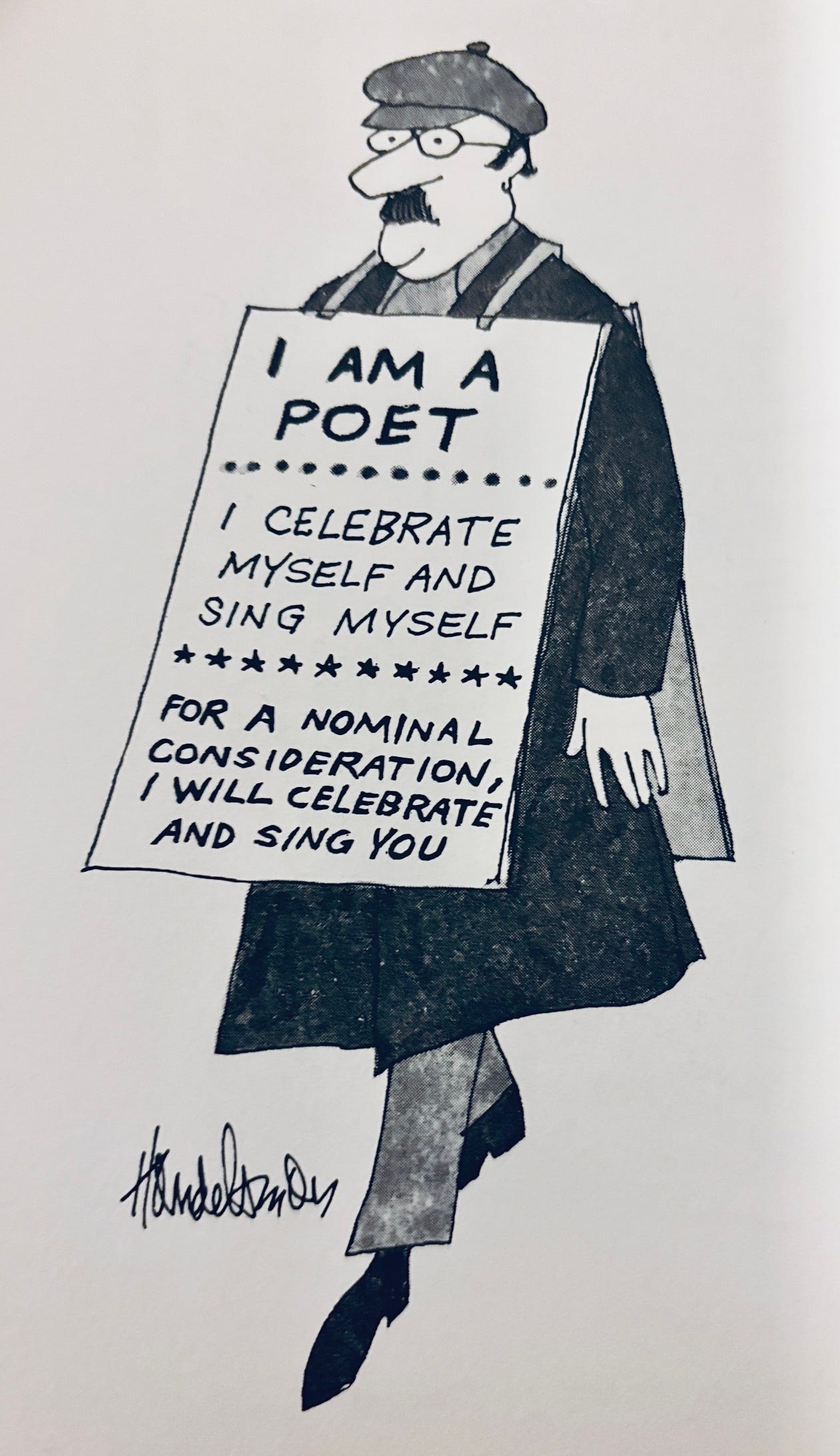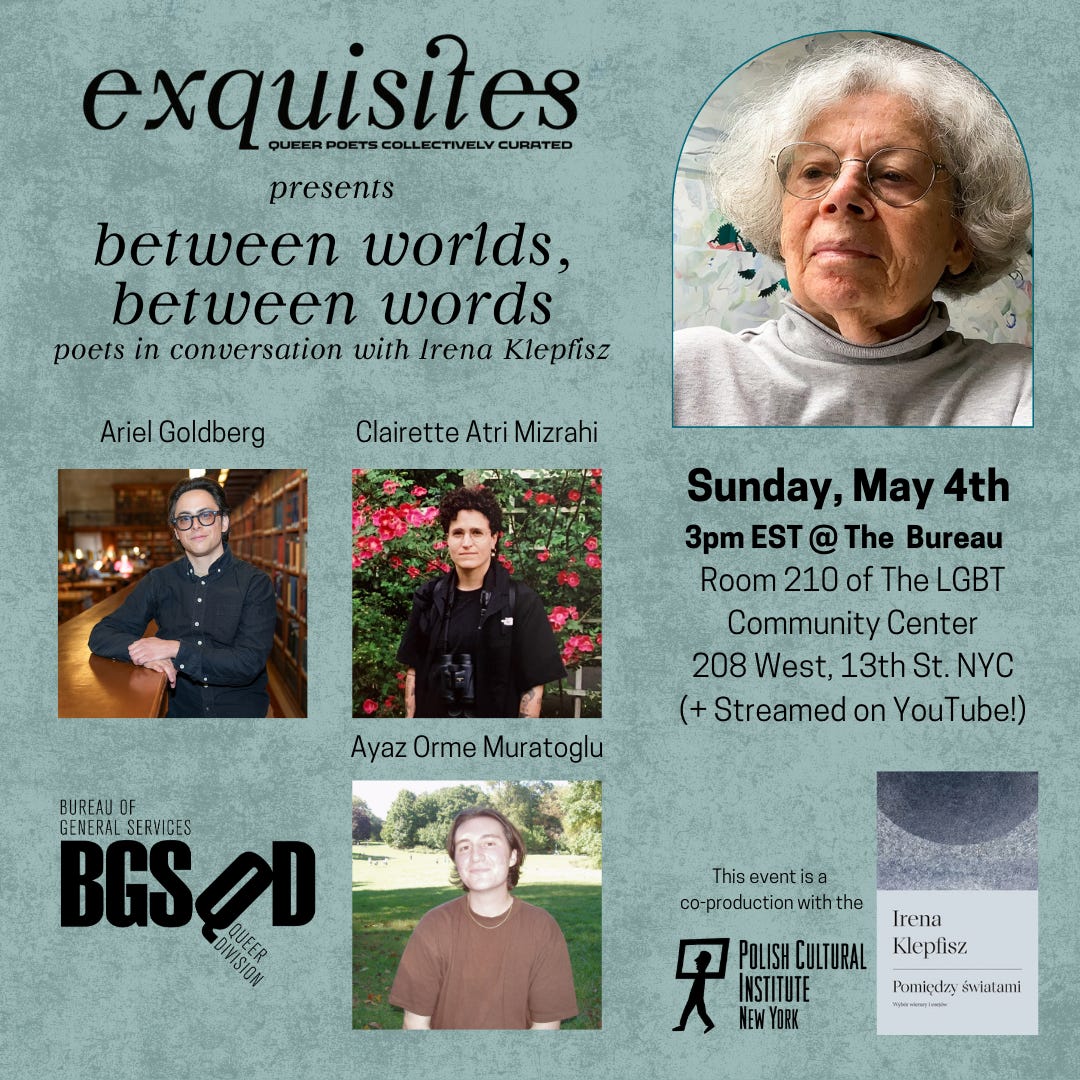
National Poetry Month1 is one of my preferred pre-sanctioned affinity months (save, of course, for the “National” of it all). I often introduce myself as a “poet first,” and poems and poets are a significant part of how I make sense of the world. Even though the power of poetry this month—or any of the other 11—can be overstated (as it is not immune from the same traps of all creative industries, guilty of the usual silos, commodification, and violences), there is real impact of poets and poems past and present to be part of (un-televised) revolutions and connections.
This April, I’ve been reading Vallejo’s Trilce for the Long Poem Support Group, hearing RFK’s obscene comments saying that autistic people kids will “never write a poem,”2 and, earlier today, I had the pleasure of launching the 2025 No, Dear first chapbook series Record Record, at the also-so-nice-they-named-it-twice gem Kissa Kissa. As part of my ongoing vinyl archiving, I’ve also been listening to recordings of Nikki Giovanni and Gil-Scott Heron.
Last March, I was set to support a program with Nikki Giovanni in celebration of the film Going to Mars. A few days before the program, the filmmakers withdrew in solidarity with Palestine. Last December, of course, Nikki Giovanni became an ancestor.
Earlier this year, I stumbled upon 1971’s Truth Is On Its Way at a vinyl sale. The record draws primarily from Giovanni’s collections Black Feelings, Black Talk, and Black Judgement, and features the New York Community Choir under the direction of Benny Diggs. The opening track combines the standard “Peace Be Still” with her poem “Great Pax Whitey.” It continues to feel present: “And america was born / Where war became peace / And genocide patriotism.”
Side A ends with “Ego Tripping,” a poem I first read in a Cave Canem workshop with Marwa Helal, and which became the (humble) jumping off point for my poem “(telling).” Especially with poems like “Ego Tripping,” it’s clear that the emergence of hip hop in the 1980s was in the lineage of poets like Giovanni, even if misogyny makes other names—like Gil Scott-Heron—more commonly cited.
***
Saeed Jones of Vibe Check ends every episode with a poem. On an episode earlier this month, in response to the absurd publicity stunt of Blue Origin’s “Taking Up Space” mission, chose Gil Scott-Heron’s “Whitey on the Moon.” Featured on the record Small Talk at 125th and Lenox (1970), the poem scoffs at the disconnect between the well-funded Apollo missions and the earthly realities of racist inequity.3 Gil was inspired by Eldridge Cleaver’s assertion that the space program was a distraction from the issues of the United States, an argument that continues to feel true in the present, as do the poem’s lines about medical debt, rent increases, and food prices. Gil was 21 years old when the record, his first, was released, one year before Giovanni’s Truth is On Its Way.
Part of my collection now includes the compilation record The Mind of Gil Scott-Heron (1978). It features the poem “H2O Gate Blues,” where Gil says:
Richard Daley, imperial Napoleonic Mayor of Chicago
Who took over from Al Capone and
Continues to implement the same tactics;
George Wallace; Lester Maddawg4
Strom Thurmond; Ronald Reagan
An almost endless list
That won't be missed
When at last America is purged
It feels easy to replace these names with current mayors, cops, and presents who won’t also won’t be missed.
***
A year before Gil’s death in 2011, he was set to perform in Tel Aviv. Pro-Palestinian activists called him out, and he cancelled the performance.
***
Back to Going to Mars (which is available to stream on Max). The film, which artfully combines archival and recent footage from readings and interviews (including her iconic conversation with James Baldwin that aired in 1971 on Soul!, the same year Truth Is On Its Way was released), is structured around her poem “Quilting the Black-Eyed Pea (We’re Going to Mars).” In the poem, and in front of podiums in the film, Giovanni talks about her interest in space travel and argues that NASA needs to send Black folks (Black woman especially, she notes, including on stage at AfroPunk) to space. She contends “The trip to mars can only be understood through Black Americans . . . When we go to Mars . . . it’s the same thing . . . it’s Middle Passage,” writing that “NASA needs to call Black America” and ask:
How did you calm your fears . . . How were you able to decide you were human even when everything said you were not . . . How did you find comfort in the face of the improbable to make the world you came to your world . . . How was your soul able to look back and wonder
And they will tell them what to do: To successfully go to Mars and back you will need a song . . .
***
In the documentary, and in this 2014 interview, Giovanni even talks about her experience with the now-unavailable Supersonic Travel (SST) that she rode to attend a friend’s funeral:
In terms of me imagining things, that’s why I want NASA to send a bunch of writers, like 10 of us, so that we could go sit down and have some wine and daydream in Antarctica. I won’t get to Mars. I would love to get to Mars. And I’ve been very fortunate because the old SST, which you’re too young to remember, supersonic transport, I was able to take that a couple of times, which goes up to 80,000 ft. So you do get to see the curve of the earth. And that was totally, totally fascinating to me. I would love to go to Mars. And I think that they need to send old ladies.
I wonder how far we are from a space mission with poets and if would ever be unattached to maniacal billionaires.
I wonder if Gayle King thought about Nikki, or Gil. Did she have time between the fear and the Katy Perry of it all?
***
Billionaire Jeff Bezos founded Blue Origin in 2000. His fiancée Lauren Sánchez was one of the passengers “taking up space.”
Another billionaire, Elon Musk, is obsessed with Mars travel. Musk was born in South Africa in 1971, where the apartheid his family benefited from would not have ended until he was in his early 20s.5
***
On my shelf
1971 means Nikki Giovanni’s Truth Is On Its Way.
1971 means Roberta Flack’s Quiet Fire.
1971 means Carole King’s Tapestry.
***
The film briefly touches on Giovanni’s criticism of the anti-apartheid movement of the 1980s, which she clarified in a 2024 interview:
I wasn’t against the boycott movement. I was not pro-apartheid. Yeah, I saw that, I’ve seen the film three times, so I saw that. And I think that what might have been misunderstood was that I thought: You clean your own backyard. And we saw people—and it’s their right, it’s their life—and they were complaining about a situation in South Africa. I never saw them complaining about the situation in Haiti. And Papa Doc and Baby Doc were some of the worst people who ever walked this earth.
And so I thought, Why are we worried about another country when we’re living in a country that is destroying or trying to destroy us? And so that was my position. And a lot of people didn’t like it. But my job is not to be liked by a lot of people. My job is to tell the truth as I see it.
I mean, we look right now at Ukraine, or we look at what’s happening with Israel and the Palestinians, and nobody can be in favor of any of that. Either way—not in favor of the Russians, or in favor of what Israel is doing because all of these people, mostly women and children now, being killed. There’s no way to be in favor of that, but we still have fourteen-year-old Black boys... and we have a woman, Breonna Taylor, who was in her bed who got shot by a cop, and they don’t even want to call him guilty. Or we get the Sandy Hook. I mean, it’s so many of them; I could go on.
Indeed, nobody can be in favor of any of that.
***
A few weeks following her death, I stumbled upon the voice of Nikki Giovanni on the rental car radio during a long drive. I don’t remember the station or the host or what city we were passing through. What I remember is that she talked about teaching (which she did at Virginia Tech for 35 years) and about a preference for early-morning classes, when her students were still half-dreaming.
***
Recent/Upcoming
The second part of my interview with alexa dexa is now up on Futch Magazine. (Here’s Part 1 in case you missed it!).
There’s two exquisites events coming up soon! Our monthly reading at Aberdeen Community Garden on May 1st:
And this special program celebrating the work of Irena Kelpfisz at The Bureau (and YouTube Live!) on May 4th, featuring Ariel Goldberg, Clairette Atri Mizrahi, and Ayaz Orme Muratoglu.
This is a somewhat recent designation, started by the Academy of American Poets in 1996.
See this Mother Jones coverage with autistic poet Elizabeth McClellan for more.
Not to mention the mission was basically just a commercial for commercial space travel, which, according to the website require a deposit of $150,000. See also Summer of Soul (2021), where those gathered at the Harlem Cultural Festival in 1969 expressed similar sentiments to the concurrent moon landing.
Lester Maddox was the segregationist Governor of Georgia from 1967-1971, who called MLK Jr. an “enemy of the people” and ran unsuccessfully for president in 1976.
More here from the Guardian: “The making of Elon Musk: how did his childhood in apartheid South Africa shape him?





